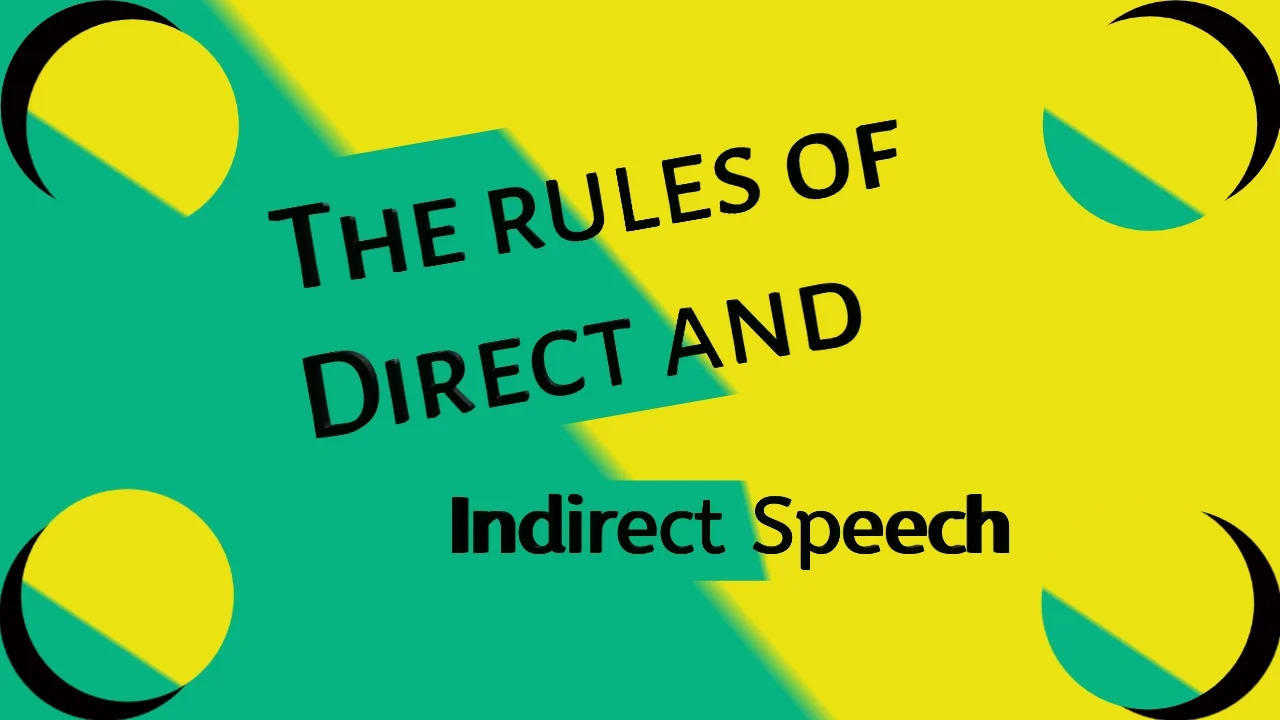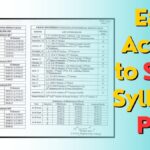Today, I’m going to tell you all the rules of direct and indirect speech with exercises. It’s the most important topic for the board and competitive exams.
Often, students avoid reading the rules of direct and indirect speech as many rules and conjunctions are used to convert direct speeches into indirect speeches.
But, if you are reading this article, I’m promising you that after reading this article you’ll know all the rules of direct and indirect speech very well.
Along with telling the rules, I’ll give some exercises based on direct and indirect speech so that you can practice more.
Hence without wasting your valuable time, let’s start writing all the rules of direct and indirect speech.
Know, how to use present participles in the sentences?
Table of Contents
The Rules of Direct and Indirect Speech with Exercises –
Before explaining the rules, you must know, what is direct speech and indirect speech?
1. What is direct speech? –
When a person expresses the statement of a speaker without any change, it’s called direct speech.
For example –
( a ) Subhash says, “I love my mother.”
( b ) Zeeshan said to Ayaan, “I worked hard for qualifying the UPSC exam.”
( c ) I said to her, “All your faults will be pardoned.”
2. What is indirect speech? –
When a person presents a speaker’s statement by making some necessary changes in his/her words, it’s called indirect speech.
For example –
( a ) Kavita said that she was going to finish her homework.
( b ) He said that he would give her his new car.
( c ) The teacher warned Shiva that he would report the whole matter to the Principal.
I hope that you must have understood, what is direct and indirect speech?
See, some examples of active and passive voice.
3. What is reporting verb and reported part? –
Let’s understand with an example.
I said to Kamala, “You are a good singer.”
Reporting verb – I said to Kamala
Reported part – You are a good singer
4. The rules for direct and indirect speech –
Now, we will learn how to change Assertive, Negative, Interrogative, Imperative and Exclamatory sentences into indirect speech.
Before starting the conversion, I’m telling you some of the rules which must be known by you.
All cases of pronouns –
| Pronouns | Nominative | Objective | Possessive |
| First Person | I, we | me, us | my, our |
| Second person | you | you | your |
| Third Person | He, she, they, it | him, her, them, it | his, her, their, its |
Change of modals –
( a ) Shall – Should
( b ) Will – would
( c ) May – might
( d ) Can – could
Change in time and place –
( a ) Today – that day
( b ) Yesterday – the previous day/the day before
( c ) Tonight – that night
( d ) Last – the previous
( e ) Tomorrow – the next day
( f ) This – that
( g ) These – those
( h ) Now – then
( i ) Ago – before
( j ) Here – there
Change in reporting verb –
( a ) Say – say
( b ) Say to – tell
( c ) Says – says
( d ) Says to – tells
( e ) Said – said
( f ) Said to – told
Change in tense of reported part –
( a ) Present Indefinite/Simple Present – Past Indefinite/Simple Past
( b ) Present Continuous – Past Continuous
( c ) Present Perfect – Past Perfect
( d ) Present Perfect Continuous – Past Perfect Continuous
( e ) Past Indefinite/Simple Past – Past Perfect
( f ) Past Continuous – Past Perfect Continuous
( g ) Past Perfect – No change
( h ) Past Perfect Continuous – No change
Note –
( a ) If the reporting verb is in the present tense, there will be no change in the sentence of the reported part except pronouns.
( b ) If the reporting verb is in the past tense, the sentence and the pronouns of the reported part will be changed as per rules.
( c ) If the sentence of the reported part is a universal truth, there will be no change in that.
5. How to change Assertive, Negative, Interrogative, Imperative and Exclamatory sentences? –
Firstly, make sure that you’ve learnt all the rules of direct and indirect speech. If you didn’t learn, it may be a bit difficult to understand the conversion.
1. Assertive & Negative sentences –
In these types of sentences, we change reporting verb as described below and use conjunction that to connect reporting verb and reported part.
- Say – say
- Say to – tell
- Says – says
- Says to – tells
- Said – said
- Said to – told
Exercise 1 –
( a ) Direct – He said, “I will provide the safety.”
Indirect – He said that he would provide safety.
( b ) Direct – Roshni said, “I committed the crime.”
Indirect – Roshni said that she had committed the crime.
( c ) Direct – Gopal said to him, “You can do this work for me.”
Indirect – Gopal told him that he could do that work for him.
( d ) Direct – Abhinav said, “I will do it now.”
Indirect – Abhinav said that he would do it then.
( e ) Direct – Kamal said, “My brother is not arriving today.”
Indirect – Kamal said that his brother was not arriving that day.
( f ) Direct – I said to Karan, “My brother is not a good singer”
Indirect – I told Karan that my brother was not a good singer.
( g ) Direct – Ramesh says to me, “I am going to the market.”
Indirect – Ramesh tells me that he is going to the market.
( h ) Direct – They said, “We have done our work properly.”
Indirect – They said that they had done their work properly.
( i ) Direct – He said to me, “You have finished reading the newspaper.”
Indirect – He told me that I had finished reading the newspaper.
( j ) Direct – The writer said, “It took me five years to complete the book.”
Indirect – The writer said that it had taken him five years to complete the book.
2. Interrogative sentences –
At the time of changing interrogative sentences into indirect speech, we change reporting verb as described below and use the conjunction if/whether to connect reporting verb and the reported part.
- Said – asked
- Said to – asked
Exercise 2 –
( a ) Direct – Kamlesh said to Meena, “Can you solve this puzzle?”
Indirect – Kamlesh asked Meena if she could solve that puzzle.
( b ) Direct – Geeta said to her brother, “Did you do this mischief deliberately?”
Indirect – Geeta asked her brother if he had done that mischief deliberately.
( c ) Direct – Josef said to me, “Do you see the cricket match?”
Indirect – Josef asked me if I saw the cricket match.
( d ) Direct – Pinky said, “Rohan, do you really want a new car?”
Indirect – Pinky asked Rohan if he really wanted a new car.
( e ) Direct – Laxman said to Ram, “Will you buy an English book?”
Indirect – Laxman asked Ram if he would buy an English book.
3. Wh type sentences –
To convert these types of sentences into indirect speech, we don’t use any conjunction to connect reporting verb and reported part.
But, reporting verb is changed as described below.
- Said – asked
- Said to – asked
Exercise 3 –
( a ) Direct – Abhay said to her, “What can I do for you?”
Indirect – Abhay asked her what he could do for her.
( b ) Direct – Ravi said to Naveen, “Why are you working so hard?”
Indirect – Ravi asked Naveen why he was working so hard.
( c ) Direct – He said, “Why did you not go to the party?”
Indirect – He asked why I had not gone to the party.
( d ) Direct – Kartikeya said to Rohan, “Where are you going?”
Indirect – Kartikeya asked Rohan where he was going.
( e ) Direct – They said to us, “Why will your team win?”
Indirect – They asked us why our team would win.
4. Imperative sentences –
To convert these types of sentences into indirect speech, we change reporting verb according to the reported part and use the conjunction to.
Exercise 4 –
( a ) Direct – Kamal said to me, “Go away.”
Indirect – Kamal ordered me to go away.
( b ) Direct – The teacher said to the students, “Don’t come in.”
Indirect – The teacher forbade the students to come in or The teacher ordered the students not to come in.
( c ) Direct – The judge said, “Call the witness of this case.”
Indirect – The judge ordered to call the witness of that case.
( d ) Direct – My father said to me, “Always help the poor.”
Indirect – My father advised me to always help the poor.
( e ) Direct – The captain said to the soldiers, “Lean down.”
Indirect – The captain commanded the soldiers to lean down.
5. Exclamatory sentences –
To change exclamatory sentences into indirect speech we use conjunction that and reporting verb is changed according to exclamatory words.
You can see below.
( a ) Said + Alas! – Exclaimed with sorrow
( b ) Said +Wow! – Exclaimed with joy
( c ) Said + Oh! – Exclaimed with Surprise/regret
( d ) Said + Hurray! – Exclaimed with Joy
Exercise 5 –
( a ) Direct – He said, “Alas! we lost the match.”
Indirect – He exclaimed with sorrow that they had lost the match.
( b ) Direct – Karan said, “How beautiful the weather is!”
Indirect – Karan exclaimed with joy that the weather was very beautiful.
( c ) Direct – She said, “Hurray! I have got the trophy.”
Indirect – She exclaimed with joy that she had got the trophy.
( d ) Direct – Kavita Kaushik said, “Bravo! You worked hard.”
Indirect – Kavita Kaushik applauded me that I had worked hard.
( e ) Direct – Mahesh said, “Wow! What a lovely car.”
Indirect – Mahesh exclaimed with surprise that it was a lovely car.
Final words –
Eventually, I hope that all your doubts must have been cleared by this article because I’ve covered here all the rules of direct and indirect speech with examples.
Now, you’ll have no problem while converting direct speeches into indirect speeches.
If you really liked this article, please share it with those who need it.
Thank you.








